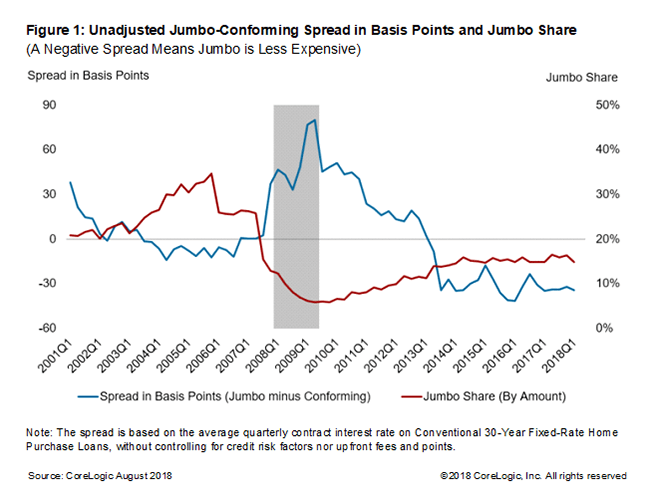Jumbo Loan: Financing Solutions for Residences Above Conforming Limits
Jumbo Loan: Financing Solutions for Residences Above Conforming Limits
Blog Article
Navigating the Jumbo Financing Landscape: Important Insights for First-Time Homebuyers
Browsing the complexities of jumbo fundings presents a distinct collection of difficulties for first-time buyers, especially in a developing actual estate market. Comprehending the important qualification needs and prospective benefits, along with the drawbacks, is crucial for making educated decisions. In addition, establishing a solid financial approach can substantially improve your leads.
Comprehending Jumbo Lendings

Since big financings are not backed by government-sponsored entities, they carry different underwriting requirements and need even more thorough economic documents. This difference can cause greater rates of interest compared to conventional lendings, given the increased threat to lending institutions. Big car loans likewise offer distinct benefits, such as the capacity to finance higher-value homes and potentially extra versatile terms.
First-time buyers should likewise realize that securing a jumbo lending often demands a larger down settlement, normally ranging from 10% to 20%. Furthermore, borrowers are normally expected to demonstrate solid creditworthiness and a secure income to certify. When checking out big funding alternatives in their pursuit of homeownership., comprehending these subtleties can empower novice buyers to make informed decisions.
Qualification Needs
Securing a jumbo funding calls for meeting particular qualification needs that vary considerably from those of traditional loans. Unlike traditional finances, which are often backed by government-sponsored entities, jumbo fundings are not guaranteed or assured, resulting in stricter criteria.
One main demand is a greater credit rating. Lenders commonly expect a minimum score of 700, although some may allow lower scores under certain conditions (jumbo loan). Additionally, borrowers should demonstrate a robust financial profile, that includes a reduced debt-to-income (DTI) ratio, typically no greater than 43%. This guarantees that customers can manage their monthly settlements along with various other monetary responsibilities.
Moreover, many lenders call for considerable documentation, consisting of evidence of income, property statements, and income tax return for the past 2 years. A considerable deposit is additionally important; while standard loans might allow deposits as reduced as 3%, jumbo finances typically necessitate at the very least 20%, depending on the lending institution and the financing quantity.

Advantages of Jumbo Financings
For numerous newbie property buyers, jumbo finances use unique benefits that can facilitate the journey towards homeownership. One of the main advantages is the capacity to finance residential properties that surpass the adapting finance limitations established by government-sponsored entities. This versatility allows buyers to access a larger variety of high-value buildings in competitive realty markets.
Additionally, jumbo lendings frequently come with attractive rate of interest that can be lower than those of conventional car loans, especially for borrowers with solid credit scores profiles. This can cause considerable cost savings over the life of the lending, making homeownership more budget-friendly. Additionally, big finances normally enable higher financing quantities without the need for exclusive home loan insurance (PMI), which can better minimize monthly settlements and general costs.

Prospective Downsides
Several potential property buyers might discover click for info that big financings featured significant drawbacks that call for mindful factor to consider. One of the primary issues is the strict certification requirements. Unlike adapting financings, big lendings generally need greater credit rating, often exceeding 700, and significant revenue paperwork, making them less accessible for some customers.
Additionally, big car loans usually come with higher rate of interest contrasted to conventional lendings, which can lead to enhanced monthly settlements and general borrowing expenses. This premium might be especially burdensome for newbie homebuyers who are currently navigating the economic complexities of purchasing a home.
One more noteworthy drawback is the bigger down payment need. Lots of lenders anticipate a minimum deposit of 20% or even more, which can position an obstacle for purchasers with minimal savings. The absence of government support for big car loans leads to less favorable terms and problems, raising the risk for loan providers and, subsequently, the loaning costs for house owners.
Last but not least, market fluctuations can considerably affect the resale worth of premium residential properties funded with big car loans, adding an aspect of economic changability that first-time homebuyers may discover complicated.
Tips for First-Time Homebuyers
Browsing the intricacies of the homebuying procedure can be frustrating for new customers, particularly when considering jumbo lendings (jumbo loan). To simplify this journey, adhering to some key techniques can make a considerable difference
First, educate yourself on jumbo lendings and their specific requirements. Understand the various borrowing Read More Here standards, consisting of credit ratings, debt-to-income proportions, and deposit assumptions. Commonly, a minimal credit history of 700 and a down repayment of at the very least 20% are necessary for authorization.
2nd, engage with an educated home mortgage expert. They can offer understandings customized to your monetary situation and aid you browse the complexities of the jumbo lending landscape.
Third, take into consideration pre-approval to reinforce your acquiring position. A pre-approval letter signals to vendors that you are a severe buyer, which can be useful in open markets.
Lastly, do not overlook the significance of budgeting. Element in all expenses related to homeownership, including building tax obligations, upkeep, and home owners' insurance policy. By adhering to these ideas, first-time buyers can approach the jumbo lending process with greater self-confidence and quality, boosting their possibilities of effective homeownership.
Final Thought
In verdict, navigating the big finance landscape requires a read the article thorough understanding of eligibility standards, benefits, and possible disadvantages. Inevitably, extensive prep work and education pertaining to jumbo financings can lead to more enlightened decision-making in the homebuying process.
When browsing the intricacies of the housing market, comprehending big fundings is crucial for newbie buyers intending for residential properties that exceed traditional financing limits. Jumbo financings are non-conforming car loans that commonly exceed the adhering finance limit set by the Federal Housing Financing Firm (FHFA)In addition, jumbo car loans commonly come with eye-catching interest prices that can be reduced than those of traditional fundings, specifically for consumers with solid credit scores profiles. Jumbo finances commonly permit for greater loan amounts without the need for private mortgage insurance coverage (PMI), which can additionally minimize general expenses and monthly payments.
Unlike adjusting loans, big financings typically call for greater credit score ratings, typically surpassing 700, and substantial income documents, making them much less available for some customers.
Report this page